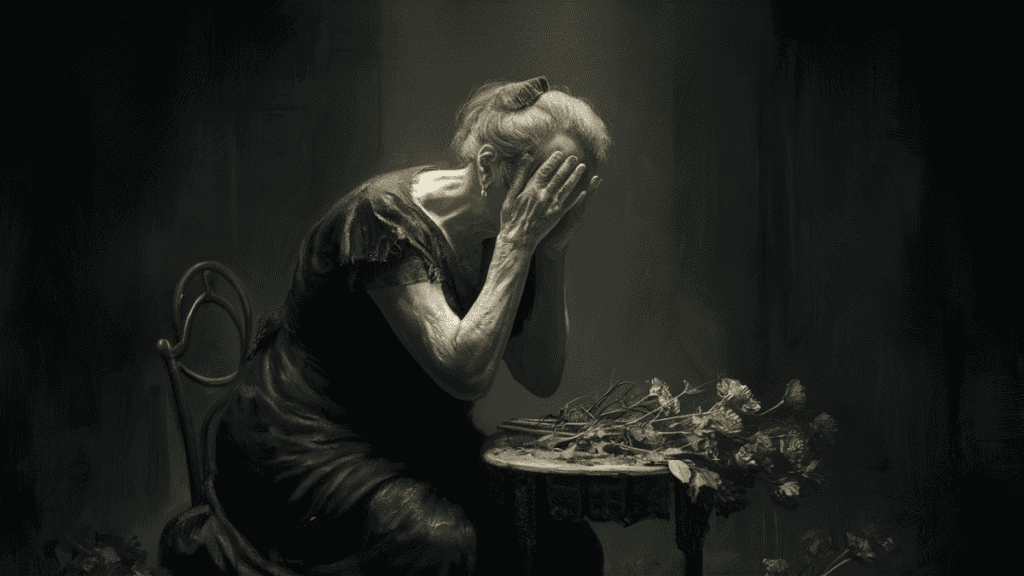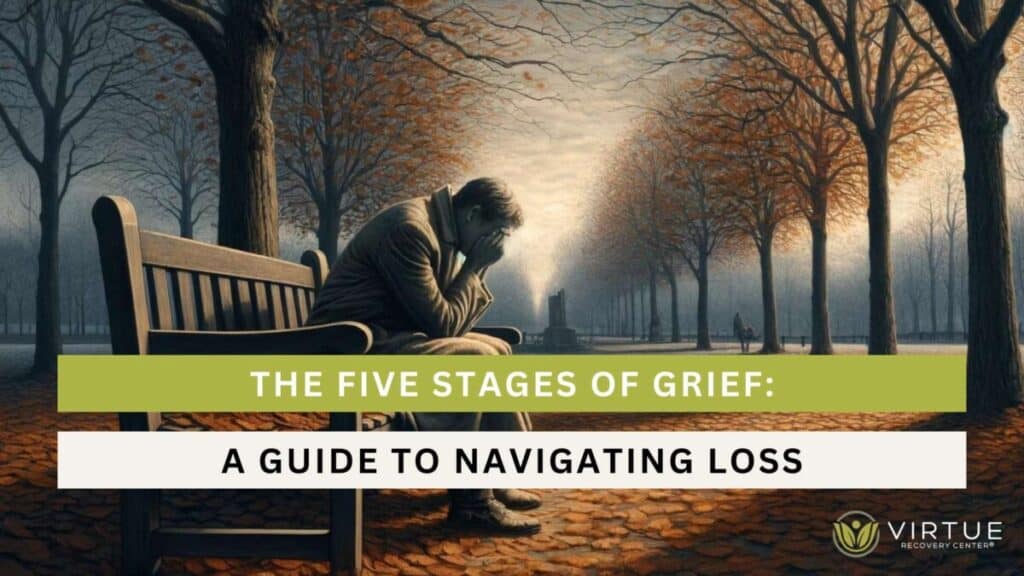Key Takeaways for The 5 Stages of Grief
- Grief has many stages, each with its own emotions and difficulties.
- These stages will enable you to comprehend your feelings and discover how to deal with them.
- Getting help and care for yourself during the grieving period is vital.
Introduction
Grief is a feeling we all experience at some point in our lives. Whether you’ve lost a loved one, lost your job, end of a relationship, or even lost your pet, knowing the stages of grief can guide you through these challenging times. Grief is a natural response to loss. Keep in mind that everyone experiences grief differently, and there is no correct or wrong way to grieve. Everyone has different tactics for coping with grief, but it’s good to have an effective one that works for you.
Stage 1 of Grief: Denial
Denial is usually the first response to a loss. Our minds shield us from the actual effect of what has happened. You may think, “This can’t be true,” or feel like a zombie. Denial is a way of dealing with the first shock. To overcome denial, you can talk to someone you trust or write down your feelings. This can make the situation more real and thus easier to deal with.
Examples of the denial stage
Denial can look different for everyone, but some common examples include someone refusing to accept a serious diagnosis, like cancer, because they feel fine and think the doctor must be wrong. Another example is someone insisting that their drinking isn’t a problem even though it’s causing issues at work and home. You might also see denial in someone who’s been laid off but keeps getting up and going to work as if nothing has changed. Basically, it’s when people can’t or won’t accept reality, often because it’s just too painful or overwhelming to face.
Stage 2 of Grief: Anger
Anger can hit you when the reality of the loss sets in. It’s normal to feel angry. You may be frustrated, helpless, or even angry at the person who died, yourself, or others. These are natural feelings and proof that you have already begun to deal with your loss. It is very important to find healthy ways of expressing your anger, such as physical activity, talking with friends, or creative outlets like drawing and music.
Examples of the anger stage
During the anger stage, people might lash out at others or the situation because they feel frustrated and helpless. For instance, someone grieving a loss might blame doctors for not doing enough, even if they did their best. A person dealing with a breakup might be angry at their ex for perceived wrongs or at themselves for not seeing it coming. You might also see anger directed at friends or family who are trying to help, with the grieving person feeling misunderstood or unsupported. It’s a time when emotions run high, and the pain often comes out as anger.
Stage 3 of Grief: Bargaining
In the bargaining stage of grief, you might think about “what if” and “if only” scenarios. Making deals with yourself or a higher power is shared in hopes of changing the outcome. Thoughts like, “If only I had done this differently,” can plague your mind. Recognizing these thoughts for what they are—an attempt to regain control—can help you move through this stage. Talking to a counselor can be very helpful during this time.
Examples of the bargaining stage
In the bargaining stage, people often try to make deals or promises in hopes of changing their situation or bringing back what they’ve lost. For example, someone might pray, saying they’ll be better if a loved one can recover from an illness. After a breakup, a person might plead with their ex to give the relationship another chance, promising to change their behavior. You might also see someone making resolutions, like vowing to quit smoking if only their health test results come back clear. It’s a way of trying to regain control and avoid the reality of their loss.
Stage 4 of Grief: Depression
Depression is usually the longest and most challenging stage of grief. You will probably be very sad, sorry, and lonely. Understanding that these emotions are a natural part of the grieving process is vital. Look for signs such as sleep or appetite changes and a lack of interest in activities you once liked. The support search, be it from friends, family, or professionals, is crucial. Self-care, which is getting enough sleep, eating well, and doing gentle exercise, can assist you in handling this stage.
Examples of the depression stage
During the depression stage, people might withdraw from activities they once enjoyed and isolate themselves from friends and family. They may feel overwhelming sadness, hopelessness, and a lack of energy. For instance, someone grieving a loss might have trouble getting out of bed, lose interest in eating, and avoid social interactions. A person dealing with job loss might feel worthless and have trouble finding motivation to search for new opportunities. This stage is characterized by a deep sense of mourning and a feeling that things will never get better.
Stage 5 of Grief: Acceptance
Acceptance is not the same as being okay with the loss; you have just realized it and are ready to go on. Once in, You begin to see a way out and find a new normal. Acceptance can be a source of peace and the readiness to face the future. To get to this point, let yourself be sad and heal at your own speed. Support groups or counseling can be a place to talk about your feelings and find acceptance.
Examples of the acceptance stage
In the acceptance stage, people start to come to terms with their loss and find ways to move forward. Someone who has lost a loved one might begin to cherish their memories rather than be overwhelmed by grief. A person recovering from a breakup might start feeling optimistic about the future and open to new relationships. Someone dealing with a serious diagnosis may focus on living their life to the fullest, making the most of their time, and finding joy in everyday moments. Acceptance doesn’t mean the pain is gone, but it becomes more manageable, and the person begins to find a new sense of normalcy.
Coping Strategies for Grief
Grieving is a complex process, but some ways can make it easier to handle. Here are a few tips for handling each stage: Here are a few tips for handling each stage:
- Denial: Let your feelings out, write them down, or show them through art.
- Anger: Participate in sports, chat with friends, or do something creative.
- Bargaining: Go for counseling, talk to someone you trust, or keep a journal.
- Depression: First, take care of yourself, then seek help, and finally, think about professional assistance.
- Acceptance: Give yourself the permission to grieve and heal and find ways how you can honor your loss.
Your well-being is the most important thing. Eat healthily, do some sports, and rest adequately. Do not be shy about asking for help from your friends, family, or even professionals.
Who developed the five stages of grief?
Elisabeth Kübler-Ross, a Swiss-American psychiatrist, developed the five stages of grief. She introduced these stages—denial, anger, bargaining, depression, and acceptance—in her groundbreaking book “On Death and Dying,” published in 1969. Kübler-Ross’s model was initially based on her work with terminally ill patients, but it has since been widely applied to various forms of grief and loss.
Are the five stages still accurate?
The five stages of grief are still considered relevant by many in the field of psychology and counseling, though they are not seen as a one-size-fits-all model. While the stages provide a helpful framework for understanding common reactions to loss, it is now widely recognized that grief is a highly individual process. People may not experience all the stages, may go through them in a different order, or may find that their grief does not fit neatly into these categories. Modern grief theories emphasize the fluidity and personal nature of grieving, suggesting that while the five stages can offer guidance, they do not encompass every individual’s experience.

Conclusion
Grief is a way of life for everyone, with many different stages. It is essential to be patient with yourself as you go through these stages. The stages of grief can be the key to your emotions, and you will know how to deal with them. Remember, you can always ask for help. If you are having difficulty, talk to someone close to you or ask for professional help.
If you or someone you know is dealing with grief, mental health disorders, or is struggling with addiction, contact Virtue Recovery Killeen at 855-788-5582. Our team is here to provide the support and guidance you need to navigate through this challenging time.
FAQs
How long does each stage of grief last?
The duration of each stage varies for everyone. There’s no set timeline for grieving.
Is it possible to skip a stage of grief?
Yes, people can move through grief in different order and may not experience every stage.
Can you go through the stages of grief more than once?
Yes, grief can be a non-linear process, and you might revisit stages at different times.
How can I help a friend who is grieving?
Please offer your support, listen without judgment, and be there for them. Encourage them to seek professional help if needed.
What resources are available for those struggling with grief?
There are many resources, including counseling, support groups, and helplines. Virtue Recovery Killeen can connect you with the help you need.
Are there 5 or 7 stages of grief?
There are traditionally 5 stages of grief (denial, anger, bargaining, depression, and acceptance), but some models expand this to 7 stages by adding shock and testing.
What are the 6 symptoms of complicated grieving?
Symptoms of complicated grieving include intense sorrow, focus on the loss, problems accepting the death, numbness or detachment, bitterness about the loss, and difficulty resuming normal life.
What is dysfunctional grief?
Dysfunctional grief, also known as complicated grief, is a prolonged, intense grief that interferes with daily functioning and does not improve over time.
What not to do while grieving?
Avoid isolating yourself, neglecting self-care, suppressing emotions, making major life decisions, and turning to substances for comfort.
What not to say to someone who is grieving?
Avoid saying things like “They’re in a better place,” “Everything happens for a reason,” “At least they lived a long life,” or “I know how you feel.”
What is the most intense type of grief?
The most intense type of grief is often considered to be the loss of a child, due to the profound emotional and psychological impact it has on parents.

Can the Five Stages of Grief be Applied to Virtue Recovery Success Stories?
The five stages of grief may not directly apply to inspiring virtue recovery success stories, but there are similarities. Like grief, the journey to virtue recovery involves denial, anger, bargaining, depression, and acceptance. It’s a process that can be emotionally challenging, but ultimately leads to growth and healing.
Resources
https://www.health.harvard.edu/mind-and-mood/5-stages-of-grief-coping-with-the-loss-of-a-loved-one
https://grief.com/the-five-stages-of-grief/
https://www.ncbi.nlm.nih.gov/books/NBK507885/
- About the Author
- Latest Posts
Gigi Price holds licenses as a Master Social Worker and Clinical Drug Counselor. She completed her master’s degree in Social Work at Texas State University. Over the last decade, Gigi has been dedicated to utilizing evidence-based practices to enhance patient care and treatment planning, resulting in positive, long-term outcomes for patients and their families. Her passion lies in creating a treatment environment where professionals collaborate to bring about positive change and provide a safe, trustworthy therapeutic experience. Patients can be confident in receiving top-quality care under her leadership.
In her role as the Clinical Director of Virtue Recovery Houston, Gigi conducted research to identify the most effective approaches for treating patients with acute mental health diagnoses, PTSD, and Substance Use Disorder. She then assembled a team of skilled clinicians who could offer various therapeutic modalities, such as Cognitive Behavioral Therapy (CBT), Dialectical Behavioral Therapy
(DBT), Acceptance and Commitment Therapy (ACT), Somatic Exposure, Eye Movement Desensitization and Reprocessing (EMDR), and Cognitive Processing Therapy (CPT). Gigi takes pride in overseeing the development and implementation of Virtue Houston’s Treatment Program, which includes two specialized therapeutic curricula tailored to the unique needs of individuals struggling with mental health issues, addiction, and PTSD.









